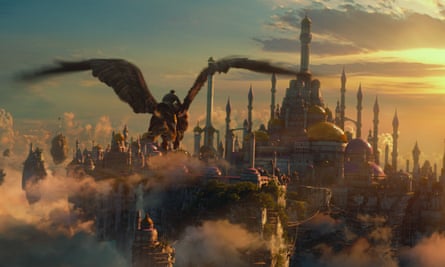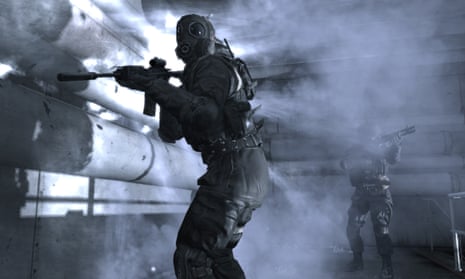It has been years since video games surpassed blockbuster movies as the biggest releases in media, but that’s never stopped games makers wanting to get a slice of the action on the big screen.
Now Call of Duty’s makers Activision Blizzard are planning an assault to rival Disney’s Marvel Universe. It plans to use the multi-layered, interconnected approach that has made Marvel’s superheroes a dominant force in cinema to turn the first-person shooter into an all-conquering film franchise of its own.Two people are tasked with pulling that off, Stacey Sher and Nick van Dyk, the co-presidents of Activision Blizzard Studios, an in-house production division that hopes to succeed where almost everyone else has failed by turning games into commercially and critically successful film and TV.
According to the pair, work on the Call of Duty films has already generated multiple scripts, and involved extensive research with military experts and retired soldiers. They are mapping out a Call of Duty universe which will draw on the feel of the different incarnations of the game rather than transposing existing plots. A first instalment could and within a couple of years after starting shooting as early as 2018 and, if all goes to plan, there will be more to follow.
“We have plotted out many years,” Sher tells the Guardian. “We put together this group of writers to talk about where we were going. There’ll be a film that feels more like Black Ops, the story behind the story. The Modern Warfare series looks at what it’s like to fight a war with the eyes of the world on you. And then maybe something that is more of a hybrid, where you are looking at private, covert operations, while a public operation is going on.”
Van Dyk adds: “It’s going to have the same sort of high-adrenaline, high-energy aesthetic as the game, but it’s not a literal adaptation. It’s a much more broad and inclusive, global in scope ... a big, tentpole Marvel-esque movie.”

Sher’s involvement brings artistic credibility to Activsion’s plans. Her credits as a producer include work on Tarantino’s Pulp Fiction, Django Unchained and The Hateful Eight, as well as other critically acclaimed releases such as Gattaca and Garden State.
However, it is her co-president Van Dyk who represents the clearest indicator of the company’s grand ambitions. As a senior executive at Disney, he played a key role in acquiring and developing the Marvel and Star Wars brands, both of which are thriving critically and commercially by carefully planning how they branch out from core stories into side-plots and characters.
With Call of Duty, he says the aim is to emulate the way Marvel has created “these individual universes that interconnect and a timeline that makes sense with consistent themes and Easter eggs”.
The pair are also looking at a TV series focused on historical conflicts such as World War 2 and Vietnam, which is how the Call of Duty franchise started, again mirroring Marvel’s four series on Netflix: Daredevil, Jessica Jones, Luke Cage and Iron Fist.
Of course, Activision has a lot of other games that seem ripe for film, and one of the most promising is Overwatch, a hugely popular multi-player title which has arguably created a Marvel for the modern age with a pantheon of distinctive characters with tech-derived powers.
Overwatch has built a back story through videos, comics and fiction released online, but because the game itself is all about team-based competitive matches it doesn’t have a traditional narrative to draw on. That might seem to offer the opportunity to tell the story of the game more directly in film, but Van Dyk anticipates a different approach, again cribbed from his time at Disney.
“Not to keep quoting my former employer, but the most recent Star Wars movie [Rogue One], was developed around the concept of somebody had to get the plans of the Death Star to Princess Leia. You have that overall construct but there were new characters, there were new plot lines, there was a new history.”
The necessary ambition and backing from Activision chief executive Bobby Kotick are clearly present in Sher and Van Dyk’s plans, but the history of video games moving to film is not exactly littered with successes. In fact, one of the most widely panned recent attempts was based on another Activision property, World of Warcraft. Despite a respected director in Duncan Jones, Warcraft was a critical stinker. It managed to become the highest-grossing game adaptation of all time, with popularity in China accounting for more than half its $434m box office, but set against a huge budget of $160m, its performance was not in the same league as the Marvel movies.
While Van Dyk and Sher won’t directly criticise the film, which was licensed out to Legendary Pictures, they see the creation of their in-house studio as an attempt to avoid the pitfalls of putting Activison’s stories in the hands of third parties.
“Blizzard sold the rights to Legendary before Activision owned Blizzard,” points out Sher. “And I think our partners at Blizzard are really excited to have people who come from the world of film and television, who are passionate about being stewards of their beloved intellectual property with them, and have the same interests of protecting, and advocating for the IP, as it moves across other platforms.”

A more encouraging sign is the success of their first project, a Netflix TV series based on children’s game Skylanders, which debuted last year. While Netflix never release viewing figures, Sher says they believe something in the region of 10 million people have tuned into the first series and the streaming service has already ordered a third series before the second has even been released.
Though they are currently focused on developing more recent titles (another intriguing prospect is StarCraft, a hugely popular strategy game that is a big competitive sport in South Korea) they are also considering raiding Activision’s extensive archive, tapping into the hearts of older gamers who remember playing the likes of Atari classic Pitfall.
“We have a very rich library,” says Van Dyk. “I would say our first order of business is existing current franchises, but there an incredible opportunity to have these hundreds of games that have huge huge followings and tremendous nostalgia.”
Of course, if they really are to go beyond the poor record of games-to-film, it will need a lot more than good source material, something Sher says Activision is under no illusions about.
“If you look at Marvel, they started working when you had Robert Downey Jr as Iron Man, and real film-makers on board as well. What I think made The Avengers so great was the writing and directing. You cared about those characters.”
“If you just chase the empty blockbuster, and have nothing to say in the genre, forget about it.”
- This article was updated on 6 April 2017 to add more information on when the first film can be expected.

Comments (…)
Sign in or create your Guardian account to join the discussion